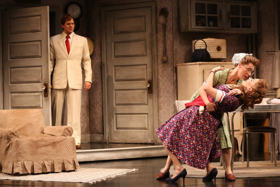Review: THE PANTIES, THE PARTNER AND THE PROFIT at Shakespeare Theatre Company

For his fifth and final work with Shakespeare Theatre Company director Michael Kahn, the playwright David Ives has not returned to rhyming couplet adaptations of French classics, as he did in "The Liar," "The Heir Apparent," "The Metromaniacs" and "the School for Lies."
Instead, his last work before Kahn's retirement at the end of the season is an adaptation of a near-forgotten piece of turn of the century German Expressionism. The provocatively titled "Panties, the Patners and The Profit: Scenes from the Heroic life of the Middle Class" is a consolidation of three plays by Carl Sternheim, who hated the "Expressionism" title but was inventive in forging a trilogy about a single German family called the Maske.
The first of the plays was initially banned because of its simple premise - that the underwear of the Maske matriarch accidentally falls while watching government officials parade by.
It's still pretty chaste in its adaptation to 1950 Boston - they talk about the embarrassing drop but don't show it. But in doing so, Louise Mask (the name has been Americanized) becomes a kind of siren for all kinds of men who witnessed the event, all clamoring to be a tenant at the modest rooming house run she runs with her husband.
While it doesn't rhyme, Ives' dialogue follows the cadences of another exacting tradition, the American sitcom. With the set and actors dressed like characters from "The Honeymooners" and hubby Joseph Mask (the rubber faced Carson Elrod) even does one of Jackie Gleason's "Bang! Zoom! To the Moon, Alice!" gestures to the line "Into the abyss."
It's an indication that as fast-moving and entertaining as the work is, there are existential crises at every corner. And whether it's sitcom 1950s, the big business world of 1987 Wall Street or the very near future of the super rich at Malibu, each scene sees a character basically saying the same thing: Who am I? What am I? All alone! No roots! Nothing to hold onto.
Such is the legacy of each generation of the Mask family as we move along to each setting. No matter how much money they have, or things they have accomplished, there is an emptiness at the center, popping up every time - just as set jokes and situations also recur in different time settings.
Most of all what returns are the actors, who are so skilled it's sometimes hard to pick out which actor is behind one part as the narrative goes on. There are traits among the distant generations, but sometimes not a lot.
Kimberly Gilbert's sitcom turn as the underwear-dropping Louise of the 1950s is stuck in an era when not everybody can nail a Boston accent, which can be distracting. Gilbert, for her part, may be still stuck in her wide-eyed portrayal of Billie Dawn in "Born Yesterday" that she just did at Ford's.
But she - and Elrod - both play amusing elderly versions of themselves in "The Partner" segment, eager to bask in the success of a son (Kevin Isola) who doesn't really want to see them.
Isola had been a barber and tenant in the first part, only to return as a rabbi in the third. His rival in all three scenes is Tony Roach, who stands tall like a Nordic god, with some kind of connection to Paul Revere.
Perhaps most surprising are the other two cast members, Julia Coffey, a neighbor in the 50s who turns powerhouse Rich Woman in the second and uber-feminist sister in the third. And Turna Mete, who is seen only briefly as a physical trainer in the first scene, turns into a ditzy heiress in the second only to become a powerfully Rich Woman who renounces it all in the third.
If the initial "The Panties" was "adapted" from Sternheim's "Die Hose," and "The Partner" "freely adapted" from Sternheim's "Der Snob," then the final "The Profit" is only "suggested" by Sternheim's "1913."
Ive is most free to spin his ideas of the future and its impending apocalypse in "The Profit," and it is also the most unmoored segment of the three, said to have been rewritten a couple of times and having the look of more rewriting on the way (or at least a way to tighten it).
Still, it's rewarding to see, amid a frantic and funny family saga at least the intent of injecting some philosophical content, even as the world goes hurtling into the abyss. And it's so very well done, from the cast to the the crack direction of Khan, to the splendid sets from Alexander Dodge, that spin on a turntable into the future, before it finally widens out to the future.
Frank Labovitz' costumes are great but the hair and wigs are fabulous, helping create the illusion of whole new characters in each piece.
What does all of it has to do with the bard? The Shakespeare Theatre Company prides itself on bringing back classic texts back to vibrant life in a provocative, imaginative and accessible style. That's precisely Ives' recipe for "The Panties, The Partner and the Profit."
Running time: One hour, 50 minutes, no intermission.
Photo credit: Tony Roach, Julia Coffey and Kimberly Gilbert in "The Panties, The Partner and The Profit" at Shakespeare Theatre Company. Photo by Carol Rosegg.
"The Panties, the Partner and the Profit: Scenes from the Heroic Life of the Middle Class" continues through Jan. 6 at the Shakespeare Theatre Company, 450 7th St NW. Tickets at 202-547-1122 or online.
Videos
